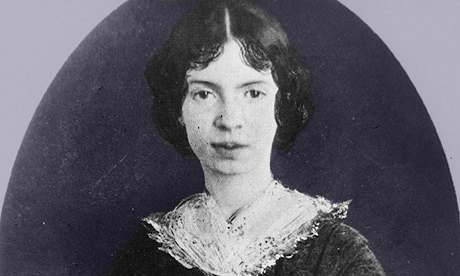
Emily Dickinson is often portrayed as the archetypal spinster, without attachment to any man. Yet if one looks towards her work, there is evidence enough of authentic romantic feeling. In the letter below Dickinson addresses a possible real-life suitor: George H. Gould, a close friend of her brother Austin (both attended Amherst College). Accounts vary of the relationship; some say that Gould proposed and Dickinson accepted, only to have the marriage prohibited by her father. This note ran without a by-line in the February 1850 issue of The Indicator, Amherst’s monthly newspaper, as a sort of Valentine.
To George H. Gould
February 1850
Magnum bonum, “harum scarum,” zounds et zounds, et war alarum, man reforam, life perfectum, mundum changum, all things flarum
Sir, I desire an interview; meet me at sunrise, or sunset, or the new moon—the place is immaterial. In gold, or in purple, or sackcloth—I look not up on the raiment. With sword, or with pen, or with plough—the weapons are less than the wielder. In coach, or in wagon, or walking, the equipage far from the man. With soul, or spirit, or body, they are all alike to me. With host or alone, in sunshine or storm, in heaven or earth, some how or no how—I propose, sir, to see you.
And not to see merely, but a chat, sir, or a tete-a-tete, a confab, a mingling of opposite minds is what I propose to have. I feel sir that we shall agree. We will be David and Jonathan, or Damon and Pythias, or what is better, the United States of America. We will talk over what we have learned in our geographies and listened to from the pulpit, the press and the Sabbath School.
This is strong language sir, but none the less true. So hurrah for North Carolina, since we are on this point.
Our friendship sir, shall endure till sun and moon shall wane no more, till stars shall set, and victims rise to grace the final sacrifice. We’ll be instant, in season, out of season, minister, take care of, cherish, sooth, watch wait, doubt, refrain, reform, elevate, instruct. All choice spirits however distant ours, ours theirs; there is a thrill of sympathy—a circulation of mutuality—cognationem inter nos! I am Judith the heroine of the Apocrypha, and you the orator of Ephesus.
That’s what they call a metaphor in our country. Don’t be afraid of it, sir, it won’t bite. If it was my Carlo now! The Dog is the noblest work of Art, sir. I may safely say the noblest—his mistress’s rights he doth defend—although it may bring him to his end – although to death it doth him send!
But the world is sleeping in ignorance and error, sir, and we must be crowing cocks, and singing larks, and a rising sun to awake her; or else we’ll pul society up to the roots, and plant it in a different place. We’ll build Alms-houses, and transcendental State prisons, and scaffolds—we will blow out the sun, and the moon, and encourage invention. Alpha shall kiss Omega—we will ride up the hill of glory—hallelujah, all hail!
Yours, truly,
C.
Notes: David and Jonathan were rival princes in succession to Saul’s throne who managed to settle their contention peacefully (as recorded in the book of Samuel). Damon and Pythias serve as exemplar friends in Greek legend; both Pythagorean philosophers, Pythias served Damon’s time in prison so that he might visit his family. The Book of Judith (considered by some to be apocryphal) tells the story of an indignant widow who beheads an enemy general in order to secure Israel’s victory.
From The Letters of Emily Dickinson. Edited by Thomas H. Johnson. Cambridge: Belknap Press, 1958.
Dickinson’s relationship with her father, and what might have led to the marriage’s undoing.
The rumored love life.
Recent publication of Dickinson’s envelope poems, the “gorgeous nothings.”


